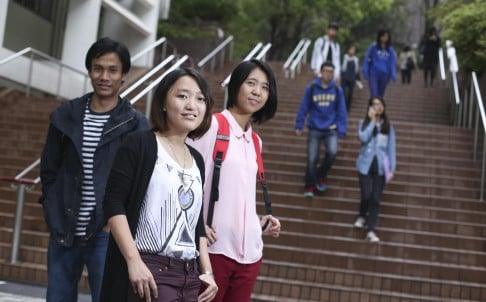Scholarships open a door to Burmese students, but some struggle to adapt
Scholarships
to Hong Kong universities can offer great opportunities for students
from Myanmar. But the cultural barriers can be insurmountable for some,
writes Mabel Sieh
PUBLISHED : Monday, 21 April, 2014, 10:05am
UPDATED : Monday, 21 April, 2014, 10:05am
From left: students Aye Thein, Thet Hnin Aye and Khine Lynn Thu are studying at the University of Hong Kong.Photo: Nora Tam
This overseas education can boost career prospects enormously. A graduate with a degree from abroad may earn up to 10 times more than a local graduate - with salaries of US$1,000 a month compared to US100, the students say.
"The education we have back home is terrible. The teachers aren't qualified. I had a teacher who gave us only 20 pages of notes for a module on world history, and she can barely understand English," says 27-year-old Aye Thein, a final year politics and public administration student.
Aye Thein is from Sittwe, a small town in the country's Rakhine state, and had completed an English degree before arriving in Hong Kong. He had no idea where he would end up when he applied for scholarships as the NGO matched his qualifications with the grants available. He still remembers what it was like when he arrived in Hong Kong. "I was amazed at how incredibly clean the city was. And I love the university library; I've never seen so many books in my life," says Aye Thein.
Thet Hnin Aye, 22, is from Yangon, and she, too, was overwhelmed when she arrived. "There were so many tall buildings, roads and cars; it's totally different from home," says the undergraduate student. Like Aye Thein, Thet Hnin Aye also had a degree from home.
There were plenty of adjustments to make at the beginning, Khine Lynn Thu remembers.
"Everything was written in Chinese in restaurants and shops. Not many local people can speak English well. It's difficult to communicate with others," says the 24-year-old from Yangon, who is studying politics and public administration.
Before coming here, Khine Lynn Thu also obtained an English degree and had worked for an NGO for two years. "Studying overseas will get me a higher position with a better salary back home," she says.
The trio are among 11 Burmese students currently studying at HKU, which has had a scholarship programme for Burmese students since 2009.
The programme was set up by Professor Ian Holliday, then dean of the faculty of social science, who has published a book and a series of journal articles on the politics of Myanmar.
"At the time, I contacted some NGOs to see if they'd be interested in a collaboration. Child's Dream was the one that got back. They kindly took me on a guided tour on the Thai-Burma border," says Holliday, who now teaches in the department of politics and public administration.
After the trip, Holliday launched the MOEI programme which takes students to the Moei River section of the Thai-Myanmar border, and other parts of Southeast Asia, to deliver English-language classes for migrant children and adults.
Based in Chiang Mai, Thailand, Child's Dream aims to empower marginalised children and youth in the Mekong region, which includes Myanmar, Laos, Thailand and Cambodia. Its scholarship programme began in 2006 and has helped 180 students obtain further education outside Myanmar, mostly in Thailand.
It brought six students to Hong Kong, including two at HKU, another two at City University and one at Polytechnic University.
But the Hong Kong experience wasn't particularly happy for the students, who struggled constantly with their grade point averages and cultural differences. The students at HKU had their scholarships discontinued after the first year.
"They told me the dorm culture was a big problem. It was a nightmare for them. I had a student … who lived as a Shan refugee. She couldn't cope at all," says Manuela Bianchi, director and chief operating officer of Child's Dream.
"If someone grows up in a bamboo village in a jungle and then comes to live in a concrete city like Hong Kong, it's not eye-opening, like people think; it's frightening," says co-founder Marc Thomas Jenni.
Dorm life also proved difficult for Thet Hnin Aye and Khine Lynn Thu; the two girls moved from Lady Ho Tung Hall to an off-campus flat when it became too much.
Having been brought up in the harsh political climate of Myanmar, the students tend not to talk about themselves or their problems.
"They have issues they won't tell you about. Their father might have disappeared or died. Some haven't heard from their family for a long time," Jenni says.
Two of their sponsored students went back to Myanmar without finishing their degrees, but one came back via another funding initiative after a year's break. Now in her final year, she is on a leave of absence, according to the university.
"We're not going to send any students to Hong Kong any more. The level of education and the cost of living are too high, and they often can't cope with the cultural differences," says Bianchi.
In response, Holliday says: "I fully understand their position As a responsible NGO, they have to [make tough choices]. Academically, students in the first batch struggled, but it was a learning experience for us as well as them.
"We've got better at selecting the right candidates. On cultural differences, our Burmese students are very happy and well-integrated into campus life, and often play key roles in cultural exchanges on campus.
"Hong Kong offers unparalleled opportunities in Asia, what with the global standing of its top universities, its outstanding networking opportunities, and the truly cosmopolitan atmosphere on its leading campuses.
"I really hope Child's Dream will build a fresh partnership with HKU," he says.
In the meantime, local institutions are promoting an understanding of Myanmar among local students and staff through conferences, service trips, and exhibitions.
http://www.scmp.com/lifestyle/family-education/article/1486983/scholarships-open-door-burmese-students-some-struggle


Comments